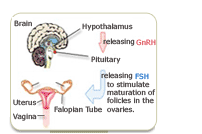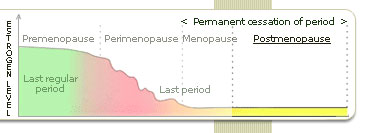34 MENOPAUSE SYMPTOMS |
HEALTH CENTER |
|
| |
|
|
|
|
|
|
Postmenopause, the last stage of the menopause transition, can be thought of as a "graduation" from the tumultuous ups and downs of perimenopause. In the same way that hormone levels eventually settle down after puberty, after menopause hormonal levels will even out and the body will adapt to this new phase of life. Many women find postmenopause the most liberating time of their lives, a period of freedom from years of menopausal symptoms, menstruation, and concerns about fertility. |
Postmenopause is the period of a woman's life after she has gone through menopause. A woman knows that she is postmenopausal when she has gone for twelve full months without any menstruation. Postmenopausal women typically also have increased levels of follicle-stimulating hormone (FSH).
During postmenopause, hormone levels steady out at consistent but markedly lower levels than during pre and perimenopause. The production sites of hormones change as well: before menopause, the ovaries were the primary production site of estrogen, but postmenopause, "secondary" production sites of estrogen, like fat and muscle, take over the majority of estrogen production. During postmenopause ovarian estrogen production declines dramatically, and the ovaries also produce a weaker form of estrogen than before.
During postmenopause a small percentage of women may continue to experience uncomfortable menopause symptoms, like hot flashes, urinary incontinence, low libido and insomnia. For most women, however, menopause symptoms almost completely dissipate during postmenopause. Nonetheless, postmenopausal women are at a much higher risk for health conditions related to low hormonal levels. Keep reading to learn more about the health risks associated with postmenopause.  |
|
|
|
|
The symptoms and health risks associated with postmenopause are caused by low hormonal levels. There is no way to reverse postmenopause, but its symptoms can be effectively managed with a variety of treatment options. |
|
|
|
|
Treating Menopause Symptoms with
MacaActive Supplements |
|
Hormones play an essential role in several areas of the body. When hormone levels reach permanently low levels during postmenopause, the health implications can be significant. As women begin to notice the symptoms of hormone deficiency, they may want to consider taking steps to stabilize their hormonal production.
Today, there are three effective ways to normalize hormonal levels: lifestyle changes, alternative medicine and drugs & surgery.
|
|
 |
Lifestyle Changes:: This first level of treatment involves no risk, but may be the hardest way to go because you'll have to restrict yourself from many things. That's why most people consider the next level of treatment, alternative medicine, which has proven to be excellent for treating menopausal symptoms in a safe and natural way.
|
|
 |
Alternative medicine: There are two types of herbal supplements for treating menopause symptoms: those containing phytoestrogenic herbs, and those containing non-estrogenic herbs. Phytoestrogenic herbs (like Black Cohosh) are filled with phytoestrogens, which are similar to estrogens. They can increase low estrogen levels by replacing some of the missing estrogen hormones. This isn't the best solution, however, because your body will become less responsive to producing estrogen on its own, causing a further decrease in body-own hormone levels. Unlike phytoestrogenic herbs, non-estrogenic herbs don't contain estrogen, but they nourish the hormonal glands to work more efficiently. This ultimately results in balancing not only estrogen, but other necessary hormones, as well. Using non-estrogenic herbs is one of the safest and best ways to treat menopause symptoms naturally.
An excellent example of a safe and effective non-estrogenic herb for hormonal imbalance is herbal MacaActive. What makes MacaActive so special is its ability to balance hormonal levels in women by nourishing the hormonal glands. In this way, it alleviates most disorders related to hormonal imbalance.  to read more about MacaActive.
|
|
 |
Drugs and Surgery: This level of treatment has the highest risk and often the highest cost. The most common drug therapy for treating menopause symptoms in the US is hormone replacement therapy (HRT). There's no doubt that this is the quickest and strongest way to combat hormonal imbalance. Unfortunately, it entails serious side effects and increases the risk of different types of cancer in women. If you still want to consider this approach, see your doctor to become better informed about what this treatment option involves.
|
|
A safe way to balance hormones:
Non-estrogenic herbs are the most effective solution for treating hormonal imbalance and its related symptoms.
MacaActive is an excellent non-estrogenic herb. It's simple: rather than putting hormones from the outside into your body artificially, MacaActive stimulates your hormone glands into producing the necessary hormones naturally. This is what makes MacaActive supplements so unique.  to read all about MacaActive. |
 |
|
 |
|
| |
Copyright� 2008 - - All Rights Reserved |
|
|






